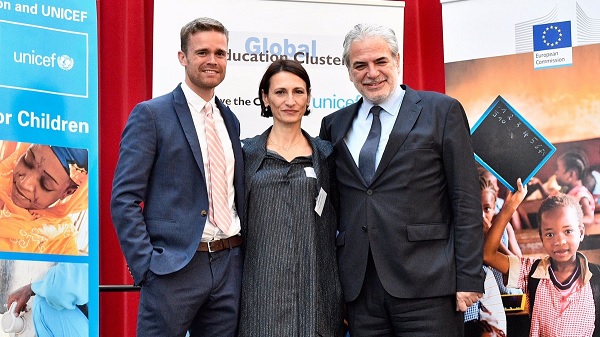
The EU’s contribution of €1 million will support the Global Education Cluster to strengthen the coordination of education responses in large-scale humanitarian crises. There are currently some 75 million children living in crisis-affected countries and forced displacement who are in urgent need of support to access quality education.
The Global Education Cluster represents the education sector in the humanitarian world and brings together NGOs, UN agencies, academics and other partners around the goal of ensuring the predictable, well-coordinated and equitable provision of education to crisis-affected populations. Its work is focused on providing operational support to country clusters. It is co-led by UNICEF and Save the Children.
The funding was announced today by Commissioner for Humanitarian Aid and Crisis Management Christos Stylianides, as he opened the Annual Partners’ Meeting of the Global Education Cluster.
“The EU is a global leader in supporting education in emergencies. At the United Nations, I recently announced that we will dedicate 8% of our humanitarian budget to education in emergencies in 2018. This is far above the global average of less than 3%. Today I am delighted to announce new funding to the Education Cluster. The Cluster plays a key role in education responses around the world by bringing together all education partners, ensuring accountability to affected populations, and linking short- and long-term education actions. By supporting the Cluster, we ensure effective coordination that helps every child to access learning opportunities in humanitarian crises.”
The Cluster’s partners, composed of humanitarian agencies involved in the delivery of emergency education services, meet once a year at the Global Education Cluster’s Annual Partners’ Meeting. This year’s meeting, on 10-12 October, is hosted in Brussels by the European Commission. It brings together around 90 education in emergencies professionals from all around the world to discuss issues such as planning and strategy for education in protracted crises, localization of education responses, accountability to affected people, and cash-based interventions for education in emergencies.
Source: European Commission
——
Other stories:
- European Union Supports Fresh Start for Returnees in Ethiopia
- UK Announces £90 Million Funding for Family Planning in Ethiopia
- New EU Funding Will Provide Essential Nutrition Treatment for 130,000 Children under the Age of Five in Ethiopia
- World Bank Group Reaffirms its Commitment to Advance Equitable Access to Basic Services for Millions of Ethiopians
- World Bank, with $600 Million IDA Fund, to Help Ethiopia Build a National Safety Net System as a More Effective Response to Droughts
